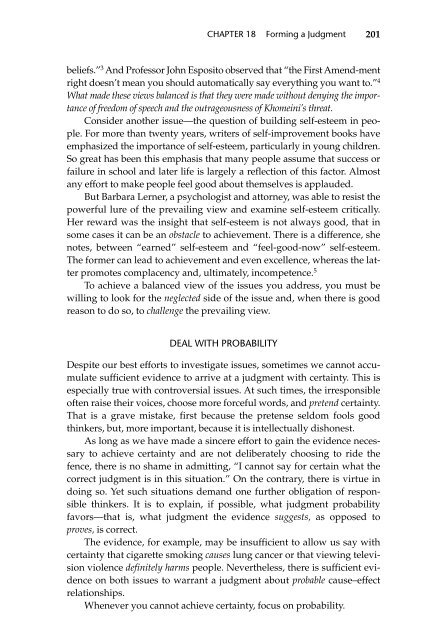Beyond Feelings
Beyond Feelings
Beyond Feelings
Create successful ePaper yourself
Turn your PDF publications into a flip-book with our unique Google optimized e-Paper software.
CHAPTER 18 Forming a Judgment<br />
201<br />
beliefs.” 3 And Professor John Esposito observed that “the First Amend-ment<br />
right doesn’t mean you should automatically say everything you want to.” 4<br />
What made these views balanced is that they were made without denying the importance<br />
of freedom of speech and the outrageousness of Khomeini’s threat.<br />
Consider another issue—the question of building self-esteem in people.<br />
For more than twenty years, writers of self-improvement books have<br />
emphasized the importance of self-esteem, particularly in young children.<br />
So great has been this emphasis that many people assume that success or<br />
failure in school and later life is largely a reflection of this factor. Almost<br />
any effort to make people feel good about themselves is applauded.<br />
But Barbara Lerner, a psychologist and attorney, was able to resist the<br />
powerful lure of the prevailing view and examine self-esteem critically.<br />
Her reward was the insight that self-esteem is not always good, that in<br />
some cases it can be an obstacle to achievement. There is a difference, she<br />
notes, between “earned” self-esteem and “feel-good-now” self-esteem.<br />
The former can lead to achievement and even excellence, whereas the latter<br />
promotes complacency and, ultimately, incompetence. 5<br />
To achieve a balanced view of the issues you address, you must be<br />
willing to look for the neglected side of the issue and, when there is good<br />
reason to do so, to challenge the prevailing view.<br />
DEAL WITH PROBABILITY<br />
Despite our best efforts to investigate issues, sometimes we cannot accumulate<br />
sufficient evidence to arrive at a judgment with certainty. This is<br />
especially true with controversial issues. At such times, the irresponsible<br />
often raise their voices, choose more forceful words, and pretend certainty.<br />
That is a grave mistake, first because the pretense seldom fools good<br />
thinkers, but, more important, because it is intellectually dishonest.<br />
As long as we have made a sincere effort to gain the evidence necessary<br />
to achieve certainty and are not deliberately choosing to ride the<br />
fence, there is no shame in admitting, “I cannot say for certain what the<br />
correct judgment is in this situation.” On the contrary, there is virtue in<br />
doing so. Yet such situations demand one further obligation of responsible<br />
thinkers. It is to explain, if possible, what judgment probability<br />
favors—that is, what judgment the evidence suggests, as opposed to<br />
proves, is correct.<br />
The evidence, for example, may be insufficient to allow us say with<br />
certainty that cigarette smoking causes lung cancer or that viewing television<br />
violence definitely harms people. Nevertheless, there is sufficient evidence<br />
on both issues to warrant a judgment about probable cause–effect<br />
relationships.<br />
Whenever you cannot achieve certainty, focus on probability.


